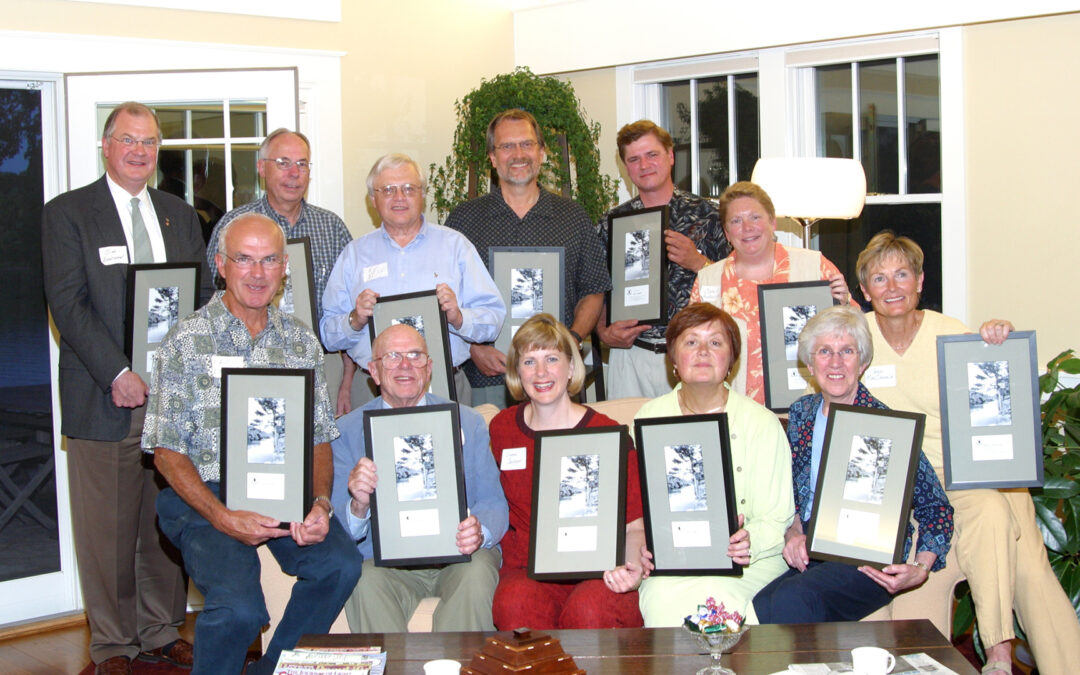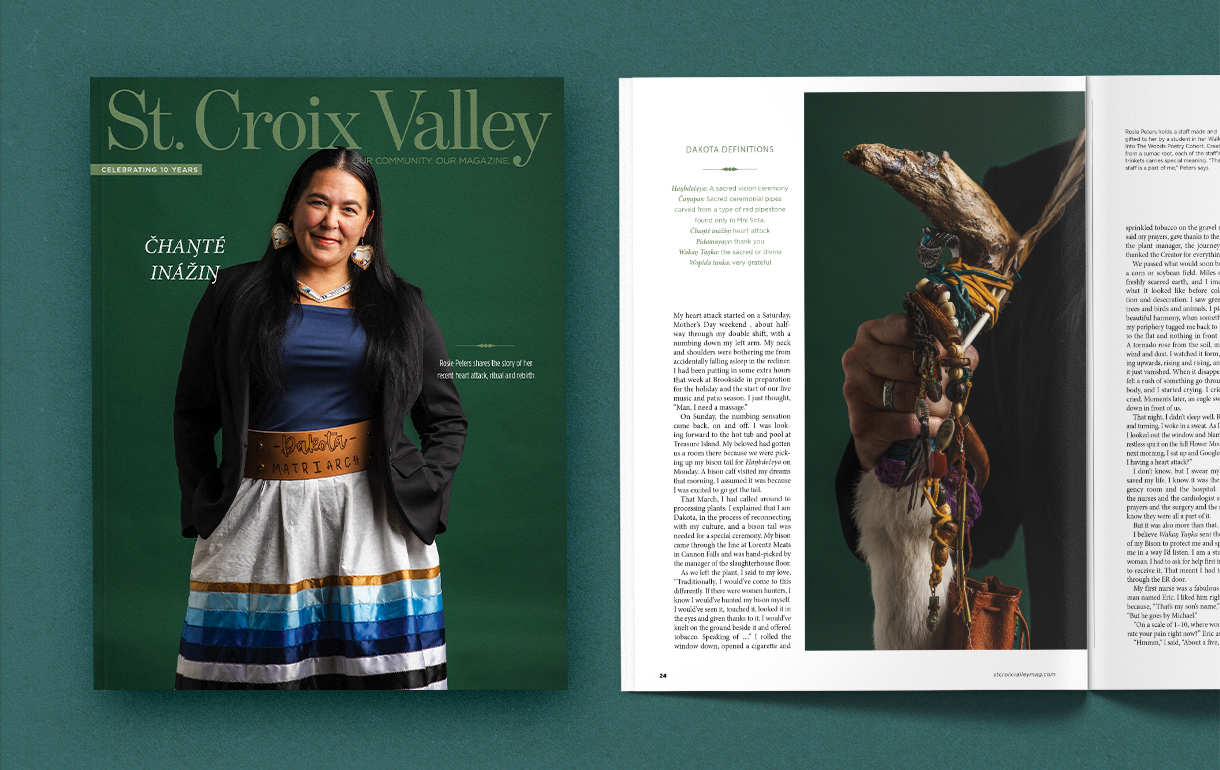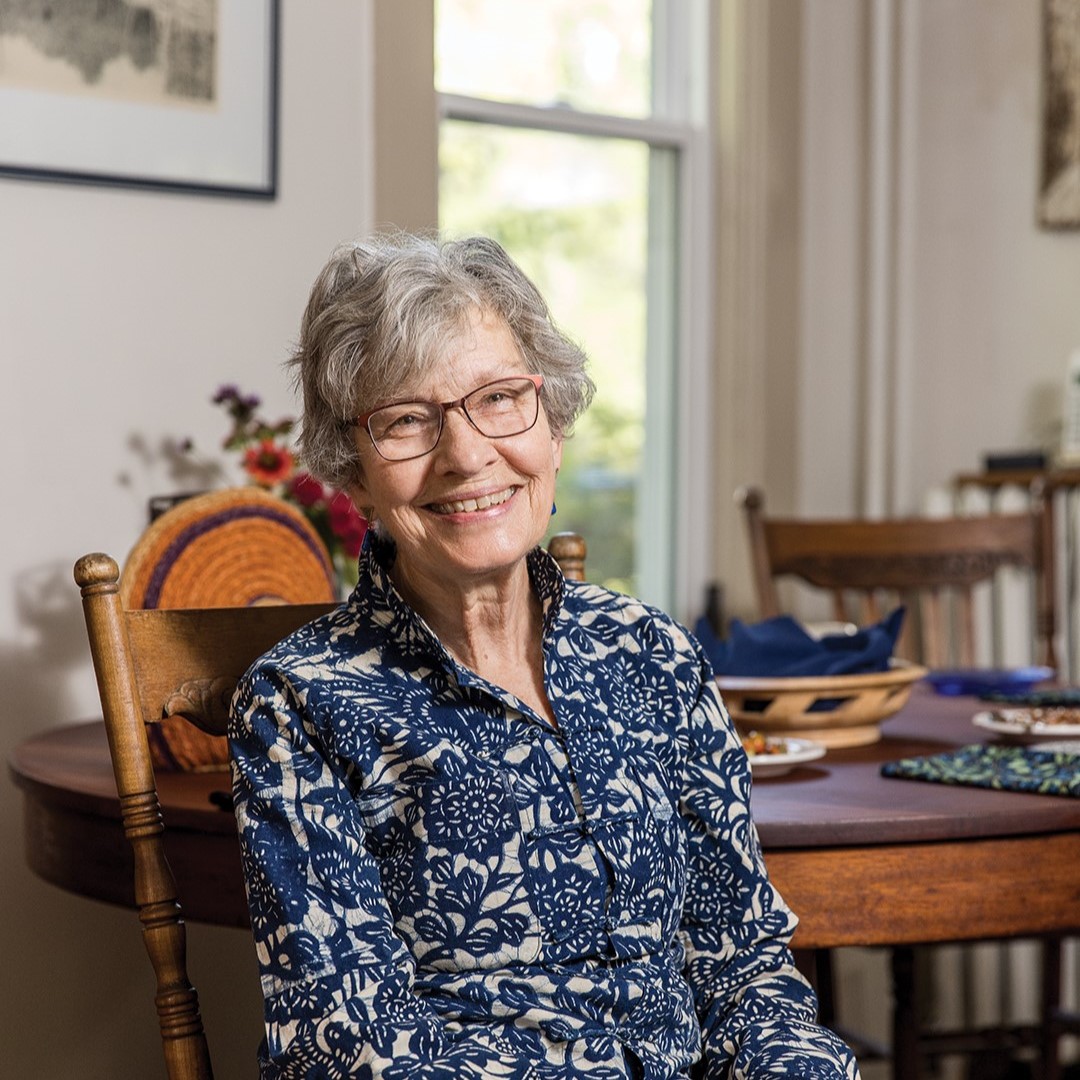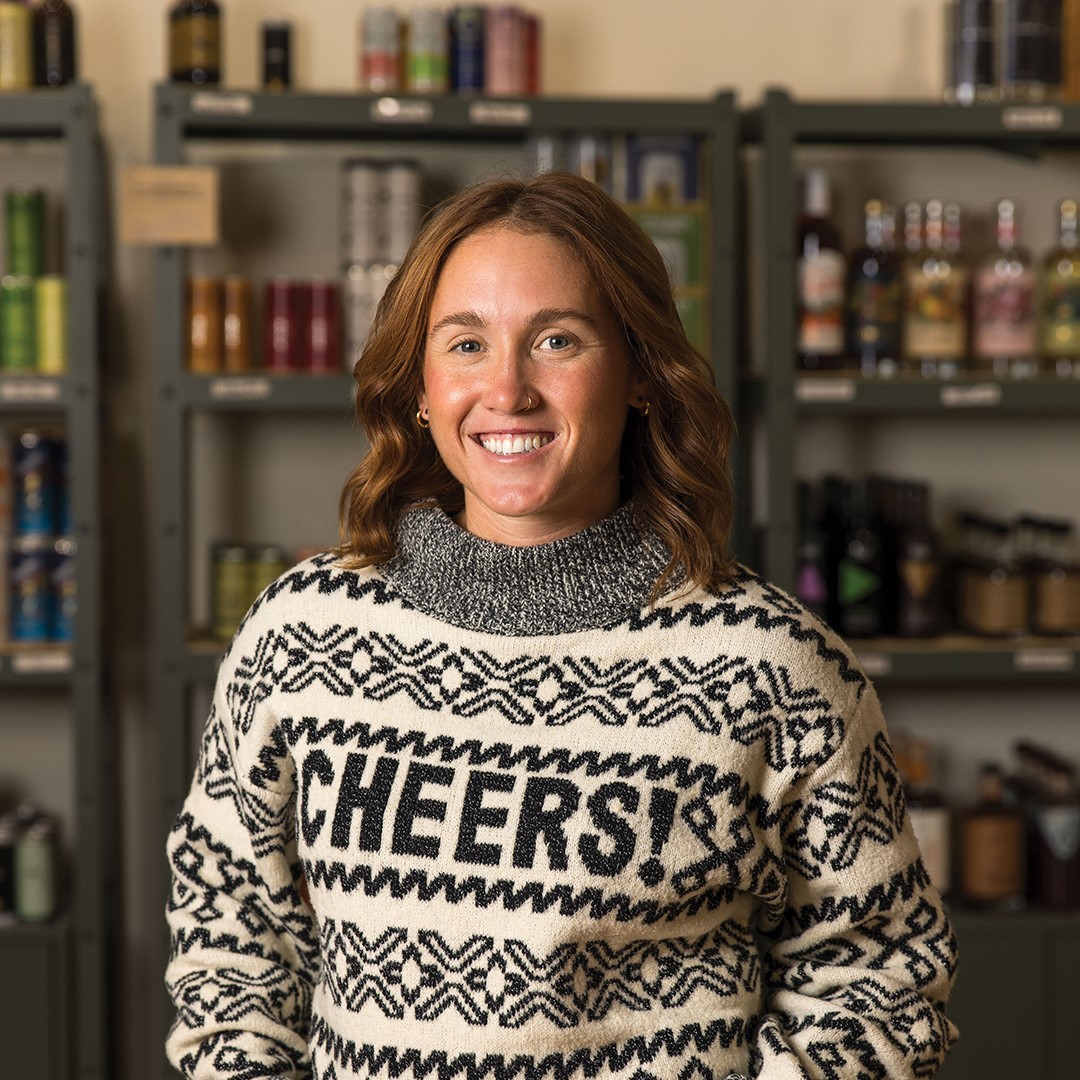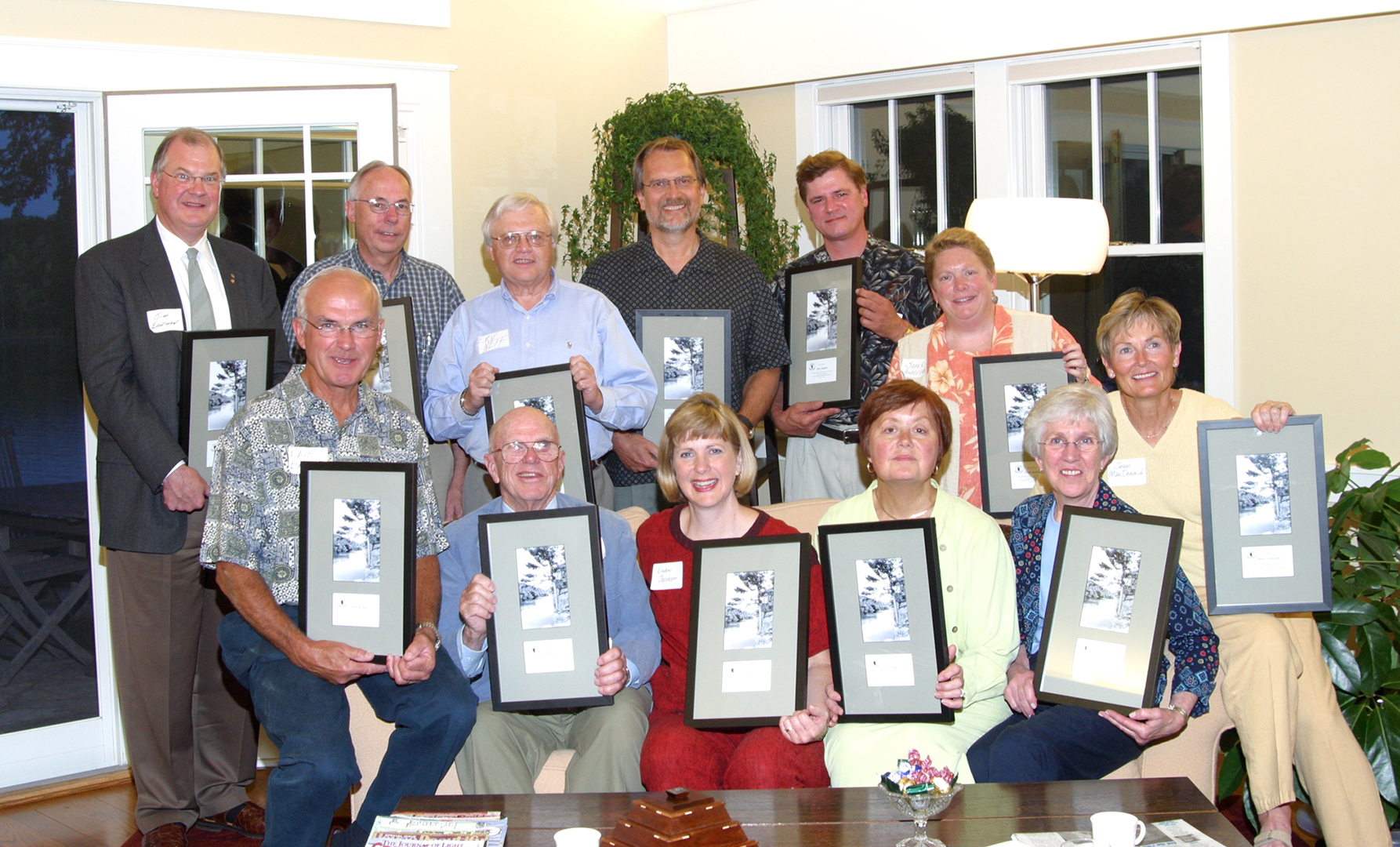
Laura Sobiech at the Church of St. Michael in Stillwater
While Laura Sobiech had many dreams for her future, she never aspired to become an author, inspirational speaker and childhood cancer advocate. Six years ago, she was happily raising four children with her husband Rob and leading an active family life in the St. Croix Valley. Life was good.
But sometimes, life takes unimaginable turns.
For the Sobiechs, their bend in the road occurred when their son Zach was diagnosed with osteosarcoma, a rare form of bone cancer, at age 14. He died on May 20, 2013, days after his 18th birthday and just shy of graduating from Stillwater Area High School (SAHS). During the final year of his life, Zach wrote a song titled “Clouds,” which became an international hit, climbing the Billboard charts, reaching No.1 on iTunes and generating more than 12 million views on YouTube. To date, his song has garnered nearly 400,000 downloads, and more than 40,000 copies of his band’s album, Fix Me Up, have been sold.
But his story did not end there.
Shortly after Zach’s death, Laura Sobiech worked through her grief while writing a memoir about her family’s experience. Fly a Little Higher: How God Answered a Mom’s Small Prayer in a Big Way was released nationally in May 2014. Sobiech now speaks publicly about Zach’s story and, along with her family, helps raise support for the Zach Sobiech Osteosarcoma Fund. While it isn’t in her nature to step up to the podium, she is proud to share their journey, particularly if it can help others going through similar experiences.

A Song
The success of “Clouds” wasn’t Zach’s alone. “It was a lot of people coming together behind one idea—Children’s Cancer Research Fund, KS95 and Rock the Cause,” Laura Sobiech says. “It took key people in key places saying, ‘We can do this’—and they did.”
Scott Herald, CEO of Rock the Cause, Zach’s record label, agrees. “Everyone brought a unique skill set to the table,” Herald says. “In some ways, it has always seemed there was a hand guiding us to build and protect Zach’s musical legacy in a permanent and meaningful way.”
Sobiech says no one expected Zach’s music to touch so many people, least of all Zach himself. But to witness it, she says, was extraordinary. Although he didn’t live to see “Clouds” climb the music charts, she says his February 2013 performance at the Up, Up, Up benefit concert at the Varsity Theatre in Minneapolis was one of the biggest moments of his life. He was in his element while singing to a sold-out, cheering crowd.
“Zach loved music. He wasn’t trying to write hits. He was sincere in his expression,” Herald says. “He knew he had an important mission. It was urgent. He went out like a comet blazing its trail across the sky.”
When asked why “Clouds” captured the hearts of so many, Herald says, “Zach sang about the struggle of realizing our own mortality and redemption. Songwriters such as Paul Simon, Jason Mraz and Rob Thomas have all praised ‘Clouds’ as one of the greatest songs of our time.” In fact, one of Laura Sobiech’s proudest moments occurred during a trip to Washington, D.C., when she and Rob met Paul Simon. Without knowing Zach’s story, or the inspiration behind “Clouds,” Simon praised Zach’s natural talent as a songwriter.
A School
Sobiech’s book begins with her memory of being worried on the first day of Zach’s senior year at SAHS and the tearful conversation they had once he returned home.
When asked why that day stood out in her mind, she says, “A few months earlier, we were told that he only had a year to live. The week before school started, he was still considering what to do with his remaining time. He wasn’t prepared emotionally for watching his friends plan for their futures, while he couldn’t.” Knowing Zach’s goals for the year were vastly different, she says, “We had to decide how he was going to do it.”
Some have questioned the Sobiechs’ decision to send Zach to school that year. “When living with a terminal illness, people often want to do the things that are most important to them,” Sobiech says. Despite the challenges, she and Rob supported Zach, because earning a diploma was on his list of things to accomplish in life, and he wanted to spend his final days with the people who were most important to him. “For Zach, in addition to his family, those people were at school,” she says.
SAHS became a sanctuary. “It’s a big school that became small because of how people supported Zach,” Sobiech says. “They did it in a way that you knew everyone was engaged with what we were trying to accomplish—get him to graduation, which we did—but also making the school his place to be, despite his limitations.”
Although he passed away a few weeks before graduation, Zach was awarded his diploma earlier that spring and remembered by the Class of 2013 at their graduation ceremony.
A Circle of Friends
In addition to SAHS as a whole, the Sobiechs are grateful for a small circle of friends who embraced their son. “There was a concrete thing that held them together,” says Sobiech of the group. “They did it. [They faced Zach’s cancer.] They didn’t abandon him or cower.”
At times, Zach struggled. “He’d wonder, ‘Why would they want to hang out with me when I’m going to be gone in a year?’ He was examining it. He didn’t want them to have to go through cancer with him,” Sobiech says.
Looking back, Zach’s girlfriend Amy Adamle of Woodbury says, “I think we were all afraid of the future and how we would deal with it, but we knew [staying at Zach’s side] was worth it. Our relationship with him and our close friends was more important than our fears.”
Sobiech speaks fondly of Adamle and his childhood friend and bandmate, Samantha “Sammy” Brown of Stillwater. “Amy took what she went through and has blossomed. Sammy has, too,” she says. “They used it to become even more beautiful people, which I think is unusual. They didn’t despair.”
While Sobiech was always grateful for her son’s friends, she didn’t realize how unique they were until the subject came up with a hospice worker. “We were told how amazing the group was for Zach,” she says. “Sadly, peers often abandon kids like him, because it isn’t easy.”
Like the Sobiechs, Zach’s close friends also felt the community’s support. “During the [Varsity] concert, there was a mind-blowing amount of support—for us and for Zach,” Adamle recalls. “That made it a lot easier, knowing how many people were wishing him the best.”
After his death, the support continued. “At first, we only saw the loss of our friend,” and they kept their grief close, Brown says. “Later we saw his impact in a much larger way.” Today, the group’s bond remains strong. They’re college sophomores now, with many of them attending the University of Minnesota together.
“We all lost someone we loved, so it can be therapeutic to get together, even on days when we don’t realize that’s what we need,” Brown says. “We remember the way he made everything that was complex seem simple. He was so good at making people happy—it was his main focus and it really showed in his life.”

In March 2013, Zach Sobiech and his band performed at a Studio C broadcast for Cities 97. Photo: Jeff Dunn

Zach Sobiech’s friends gather at the University of Minnesota’s Northrup Auditorium: Kelly Moeller, Amy Adamle, Mitch Kluezner, Andreas Fenner and (seated) Samantha “Sammy” Brown. (Photo by Marissa Martinson)
A Fire Department
Ten years ago, Sobiech joined the Lower St. Croix Valley Fire Department as a volunteer firefighter and EMT to add a bit of adventure into her life. She had no way of knowing that one day the department would become a source of comfort.
As Zach’s illness progressed, Sobiech could delve into her work at the fire department and take an emotional break from cancer. “It’s great to be a part of that team, because when things were tough, I could say, ‘Here’s what’s going on.’ But when I was at work, I didn’t have to focus on it. I could just do my job.”
Everyone in the department followed Zach’s development and supported the family. “They were so amazing at accommodating us when things got hard,” she says. They were vested in Zach’s care and joined other neighbors and friends in providing meals and assistance when times were most difficult.
“Knowing we had the fire department’s support was a comfort to all of us.” In her book, Sobiech details how grateful she was, on the morning of Zach’s death, that her friends from the department were the ones who compassionately tended to him.
“Later on, one of the guys who was there that morning told me he had never seen so many people respond to a call. They all heard the call come in. They knew the address. They were there. In the final moments, it was their chance to really shine,” Sobiech says. “And they did.”
A Church
Sobiech’s spirituality is woven throughout her memoir, and many book reviewers have expressed being inspired by it, regardless of faith. For the Sobiechs, solace was found at the Church of St. Michael in Stillwater.
“When you have something like cancer, your whole life is about that,” Sobiech says. “Knowing that Zach was on the minds of [church] volunteers who went to the chapel and supported him spiritually gave me the time to focus on being his mom,” particularly when they were in the hospital.
She first felt the impact of those prayers the moment she had to tell Zach he had cancer. “I was terrified, and I know those prayers gave me strength that day,” she says. “The students at St. Croix Catholic School also offered prayers, and children’s prayers are so potent.”
During Zach’s illness and afterward, “We felt support though people in the community who served us with meals, shoveled snow from our driveway, or cleaned our house when we were away. I can’t express enough how important it was to have that kind of support whenever Zach was in treatment or very ill.”
A Legacy
The Sobiechs created the Zach Sobiech Osteosarcoma Fund at Children’s Cancer Research Fund and direct proceeds from his music and other fundraisers held in his honor to help researchers find better treatments to prevent and cure this devastating disease.
In collaboration with pediatric sarcoma expert Dr. Brenda Weigel of University of Minnesota Health, one of Children Cancer Research Fund’s chief medical advisors and Zach’s primary doctor, a multi-phase research project is now underway. The project has brought together an A-team of basic and translational scientists with outstanding records of achievement in sarcoma research, including a veterinarian who treats canine patients with osteosarcoma. The partnership with Children’s Cancer Research Fund allows 100 percent of donations made to Zach’s fund to go directly toward research. Currently, the fund is at $946,440.00. “It’s been so exciting for us to see that team of researchers breach the science wall. We can see the tangible things happening with this team of doctors and researchers who are coming together to figure out osteosarcoma, which is considered a rare, orphan disease that doesn’t get much funding,” says Sobiech. “I don’t think it was an accident that Zach got this disease here in Minnesota, as weird as that sounds.”
From a medical perspective, “words cannot capture the importance of the Zach Sobiech Osteosarcoma Fund to the dedicated team of physicians and scientists,” says Dr. Weigel. “This fund has solidified the U of M as one of the leaders in osteosarcoma research and has allowed a much more focused program to be formed around a rare disease.
When asked about Zach’s legacy, Dr. Weigel says, “Zach’s story is so powerful and inspires families and patients on a daily basis. I get asked almost every day if I knew Zach and I humbly say ‘yes’. The impact of his musical gifts will truly benefit generations to come due to his and his family’s commitment to research for osteosarcoma.”
A Guitar Pick
While Zach is gone, his presence is still felt in little things, like the appearance of guitar picks in unlikely places.
“You have to be vulnerable and open to see the reminders of Zach,” Sobiech says. “For me, it’s a nudge from him, saying ‘I’m still here.’”
The family still has difficult days, particularly during the holidays, but Sobiech says, “I think we’re doing remarkably well because we’re still getting so much feedback from people – people who have been there the entire time, and some who are new to our story or who have just heard Zach’s song or read the book.”
“I’m still wrapping my head around the idea of how much of an impact he’s made – how he’s touching people,” Sobiech continues. “I don’t know what [surviving the death of a child] would be without it. I think silence afterward would have been so much more difficult,” and she thinks often of other families like hers.
Zach’s friends feel the same way. “His story is still very much alive, which helps us remember him,” Brown says. “There are constant reminders of him. People who were touched by him are still reaching out. Sometimes, it feels like he isn’t even gone.”
While Zach’s family misses him daily, they’re doing well. Their oldest daughter, Alli Shoemaker, is married, living in Chicago and working with the Children’s Cancer Research Fund. According to Sobiech, Shoemaker’s work speaking with families like hers, whose children are going through childhood cancer, has been personally rewarding. Their son, Sam, is pursuing a college degree in biochemistry with the aspiration of working in the area of genetics and cancer. Their youngest, Grace, is a sophomore who’s making her own contributions at SAHS.
A Silver Lining
“Every person who has been involved in this has helped change the world – our family is just in the epicenter. That’s huge and beautiful. And it’s so simple,” says Sobiech. “We have these opportunities every single day. As a family we’ve learned that it doesn’t take much to make a big impact on others. It’s the butterfly effect.”
Her son Zach felt the same way. “It’s really simple. Try to make people happy,” he had said. It was that spirit that led the young songwriter to leave his mark on the world, like a bright silver lining on a billowing cloud.

For the past two years, thousands have gathered at the Mall of America to sing Zach Sobiech’s song, “Clouds,” and raise awareness for the Children’s Cancer Research Fund, which created the Zach Sobiech Osteosarcoma Fund. Through that partnership, 100 percent of donations made to Zach’s fund go directly toward osteosarcoma research. Photo: Tony Nelson



